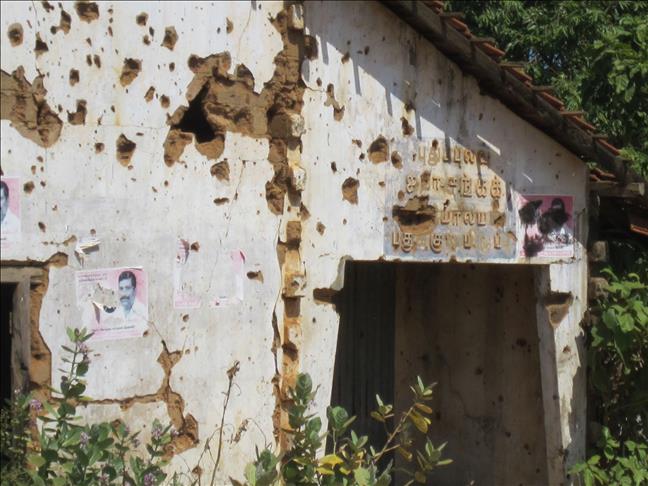
By Dushiyanthini Kanagasabapathipillai
MULLAITHIVU, Sri Lanka
Sri Lanka's nearly three decades-long civil war was forcibly ended in May 2009. In its last stages, daily shelling and bombing killed thousands of innocent civilians cornered into "no fire zones." Thousands more have disappeared over the years, women became widows, and buildings have been left in disrepair.
In the five years since the Sri Lankan army crushed the Liberation Tigers of Tamil Eelam -- the Tamil Tigers -- the country has struggled to move on. This year's victory day parade saw a military showcase, army regiments paraded with flags and rifles, and Sri Lanka's President Mahinda Rajapaksa spoke about the need to "protect the peace."
The effect of that message was limited for the families of fighters lost on both sides. Visaka Dharmadase is just one among many Sinhalese mothers; she had encouraged her son to enlist in the army in 1995, when the nation was hopeful of an end to the war.
"I never knew what is war. I never felt the danger that I was putting my son into," says Dharmadasa, who now campaigns for the families of fallen soldiers. "Five years after the end of the war, what have we achieved as one united country? Only the pain of loss of loved ones, and not knowing the fate of the missing, and youth with permanent disability, and shattered lives remains in the hearts of the people in the north, east, and south."
The deprivation Dharmadasa feels is shared by Tamils in the north. While the national victory celebrations were held on the south coast, the same type of event was not permitted for Tamils. Thousands like Varatharajah were denied the chance to mourn the dead. Roads were blocked and people in Jaffna were prevented from performing religious rites for their dead at the revered Keerimalai Springs.
Former Tamil Tiger Mary Gunawathy Varatharajah's husband was a commander in the rebel force and surrendered to the government forces on the last day of the war.
"I was assured of his wellbeing by the security forces who were present at the time of surrender," says Varatharajah. "But, I have not seen him afterwards, I have visited all the prisons and detention centres in the country, but I didn't see him anywhere."
In March, the United Nations approved an inquiry into the alleged war crimes, focusing on the last stages of the war. The Sri Lankan government however, insists that its own domestic programme, Lessons Learnt and Reconciliation Commission, is making progress. Many Tamils disagree.
"There is neither transparency nor trust in the local mechanism to investigate war crimes. It should be properly conducted by an independent and international panel of experts," says Varatharajah.
The numerous missing people has stalled grieving for families who sat on both sides of Sri Lanka's divide, but many Tamil families feel particularly aggrieved. They do not buy into the praise for the reconciliation process, saying that the end of the war has only meant continued discrimination. In post-war Sri Lanka, they say, they have been told who, when, where and how to mourn.
Anadolu Agency website contains only a portion of the news stories offered to subscribers in the AA News Broadcasting System (HAS), and in summarized form. Please contact us for subscription options.

